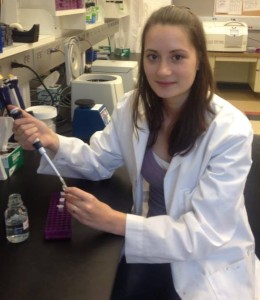
The Stephen J. O'Brien Award for the best student paper published in AGA's Journal of Heredity is intended to honor Dr. O'Brien's many years of service as Chief Editor of the Journal. This year, twelve substantive articles in Volume 108 that were first-authored by a student were considered, and the award presented to Frances 'Betsy' Clark for her article, Dynamic Sequence Evolution of a Sex-Associated B Chromosome in Lake Malawi Cichlid Fish (Frances E. Clark, Matthew A. Conte, Irani A. Ferreira-Bravo, Andreia B. Poletto, Cesar Martins, and Thomas D. Kocher. JHered 2017. 108-1, pp 53-62.)
The evaluation committee had the following comments on this top-ranked article:
'This interesting study integrated multiple approaches to characterization of female-specific B chromosomes in cichlid fish. The authors proposed two drive mechanisms that can explain the patterns. The paper was well written and offered strong conclusions.'
Frances will receive a $2,000 prize, a certificate, and up to $1,500 toward expenses to attend the 2018 AGA President's Symposium.
The article is freely available to read and download.
Supernumerary, or B, chromosomes are extra chromosomes present in some members of a population, but not others. They often manipulate the processes of mitosis, meiosis, and fertilization to increase their transmission above Mendelian expectations. As a result, B chromosomes have several unique characteristics and often do not conform to the ploidy of the cell.
Despite the widespread presence of B chromosomes in eukaryotes, little is known about how they evolve, how they accomplish their increased transmission on a molecular level, and the evolutionary consequences they impose on the rest of the genome. Previously, a B chromosome was identified in one species of Lake Malawi cichlid. This study further identified B chromosomes in 6 additional species. Standard genetic quantification methods (PCR and qPCR) were used to detect and quantify this supernumerary chromosome, demonstrating that every individual carrying the B had only a single B per diploid cell. This study also confirmed that only females (never males) in these species had the B chromosome, but not all females had it. This allowed the authors to eliminate a variety of possible mechanisms leading to increased transmission, and propose two mechanisms that were consistent with these findings.
The female-specific presence of this B chromosome is particularly interesting and traditional genetic crosses are currently being used to test the hypothesis that this chromosome is also functioning as a sex chromosome in these species. Next generation sequencing (both DNA-seq and RNA-seq) is currently being used to study the sequence composition of the B chromosome, the transcription of the B, and the transcriptional effect the B has on the rest of the genome; all with the ultimate goal of understanding how this chromosome accomplishes its increased transmission and female-specific presence.
Frances obtained her BS in General Biology from the University of Washington in Seattle. During her time at the UW, she worked in Dr. Samuel Wasser

Check out our Editor's Choice article by Zimmerman et al., examining the great plains bison at American Prarie, while our cover this issue is courtesy of Winter et al., who lay out the best assembly yet of the beautiful Ural owl
AGA member have elected a new President and Councilors.
Jeff Good
Katie Lotterhos
Al Roca
Christine Edwards
Klaus-Peter Koepfli
Michael Russello
Nevé Baker
Apply now for an AGA
Any questions? Contact the Managing Editor at theaga@theaga.org.